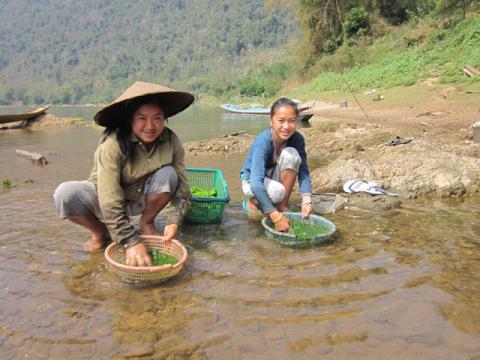Riverweeds help change lives of women in Luang Prabang

As the main income-earner, Lao men traditionally never help women with their chores. Significant indications of their domestic roles are clearly demonstrated in their distinct responsibilities at home. Men are expected to prepare the fields, split firewood, and do construction jobs. Women on the other hand, take care of the children, do household work, gather forest products, fetch water, collect firewood and help tend the farm and animals. While men’s work is apparently tedious, women toil harder and most often, longer.
Hadchan village mother Chanhdy, does not defy the norm. She indisputably goes to the forest to look for mushrooms and wild vegetables to vend to augment her husband’s income. “When I’m away from home, I worry about my children. I always fear that they may come near the riverbank to play.” But Chanhdy’s anxiety started to wane when World Vision introduced a Riverweeds Production Project in their district in 2008.
Chanhdy was among the 90 women from nine villages of Muang Ngoi in Luang Prabang province who received a 3-day training that demonstrated how the naturally-grown riverweeds are collected, washed clean, sun-dried on trays or cogon grass, spiced, and properly packed. “I used to produce riverweeds just for my family. I did not realize it can be processed in many ways,” says Bounthan, a mother and one of the participants.
The riverweeds (most refer to them as seaweeds but a Lao editor insisted it be called riverweed because they come from Mekong River tributaries and not from the sea) are actually greenish algae that grow in Nam Ou River circling around the district.
Locally called khai pene, the production process is painstaking – flattened manually by the women, mixed with garlic, sesame seeds, tomatoes and other condiments - until the tiny pieces become one large piece, dried and packed in plastic wraps.
The Ngoi women’s eyes brightened up with their business prospects as soon as they were brought by World Vision in town to see how big the demand for the riverweed is. The project taught them how to cultivate, gather properly, process and market.
That was the start of a brisk business for the women. Now, every 2-3 days, a buyer comes to the villages to buy their products. A pack that contains 10 pieces of riverweeds costs between 10,000-15,000 Lao Kip (LAK) or USD 1.2-2. The estimated income of the families amounts to 300,000-400,000 LAK (USD 37.3-50) per month.
Apart from the income they generated from the newfound flourishing livelihood, the women value the increased self-esteem and financial independence. Chandy is proud to contribute to sending her children to school. “For rural women like us, the earning is very substantial,” she stressed. She prepares the riverweeds at home and can look after the children.
Aimed at empowering women by helping them earn additional income for their families, the project also helped changed the lives of women in the rural areas. Fortunately, the Lao Government has been very active in promoting gender equality and awareness, with the strongly-supported Lao Women’s Union in the forefront.
Promoting gender equality is Number 3 in its Millennium Development Goals (MDGs) targets, to quote – Women in Lao PDR generally experience a lower standard of living than men and suffer from gender disparities, particularly in rural areas, and among ethnic minorities. Women and girls continue to be disadvantaged in terms of access to educational opportunities. Fewer girls than boys are enrolled in school, and the proportion falls steadily as the level of education increases. Goal 3 calls on countries to ensure that girls have equal access to education by 2015 and to enhance women’s empowerment.
It is a long way to go, but women in Ngoi has started the campaign to get themselves counted for their children’s and country’s future.